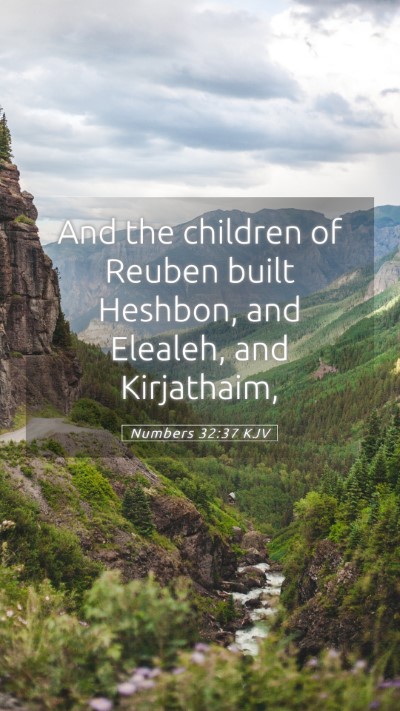Understanding Numbers 32:37
Numbers 32:37 states: "And the children of Reuben built Heshbon, and Elealeh, and Kirjathaim." This verse is part of the narrative detailing the tribal allotments in the Promised Land, documenting the actions of the Reubenites. It sheds light on the themes of land possession, the fulfillment of God’s promises, and the responsibilities that come with such blessings.
Meaning and Context
The broader context of Numbers 32 describes the tribes of Reuben and Gad as they request to settle on land east of the Jordan River, rather than crossing to the west where the land of Canaan lies. This request raises questions about their loyalties to God and the covenant community. Here, the mention of Heshbon, Elealeh, and Kirjathaim shows specific cities being built, indicating their investment and establishment of a presence in the land they desired.
Bible Verse Explanations
-
Matthew Henry's Commentary:
Henry emphasizes the importance of fulfilling commitments made to God, interpreting the actions of the Reubenites as a significant statement about their priorities. The cities built illustrate a tangible commitment to their chosen land, yet also warrant caution about their overall allegiance to the Israelite community.
-
Albert Barnes' Notes:
Barnes provides insights into the geographical and historical implications of the cities mentioned. He highlights Heshbon as a significant city in the region and notes the strategic, economic, and social consequences of the Reubenites' choice to settle there, thus reflecting their intentions and aspirations.
-
Adam Clarke's Commentary:
Clarke offers a detailed examination of the cultural and military aspects of these cities. He points out that the building of cities is not just an act of agriculture but indicates a readiness for defense and community life, suggesting the complexities involved in their chosen settlement.
Biblical Exegesis and Themes
The verse serves as a focal point for discussions on several themes, including:
- The importance of commitment: The Reubenites made a choice that signifies their stability and priorities in relation to God’s calling.
- Community and identity: Their actions raise questions about communal responsibilities and the implications of separating from the main body of Israel.
- God's faithfulness: The establishment of cities is a reminder of God's provision and the fulfillment of His promises to the tribes of Israel.
Application of Scripture
For modern readers and Bible study groups, Numbers 32:37 offers lessons on the importance of being rooted in community, making deliberate choices in faith, and understanding the historical context of one’s decisions. This verse poses reflective questions on our commitments—are we investing in our spiritual community as the Reubenites did, or are we opting for personal desires at the expense of communal identity?
Cross References
- Deuteronomy 3:12-17 - Details the division of lands among the tribes.
- Joshua 1:12-15 - Discusses the conditions for the Reubenites and Gadites regarding their commitment to assist in the conquest of Canaan.
- Genesis 49:3-4 - Prophecy regarding the tribe of Reuben that speaks to their legacy and concerns in leadership.
Conclusion
In summary, Numbers 32:37 encapsulates a critical moment in Israel's history regarding territory, identity, and faithfulness to God's directive. The construction of cities signifies more than mere settlement; it calls into the question the depth of commitment one has towards God and the community at large. Engaging with this text through various Bible study tools and discussions can yield rich insights into our personal and communal faith journeys.


